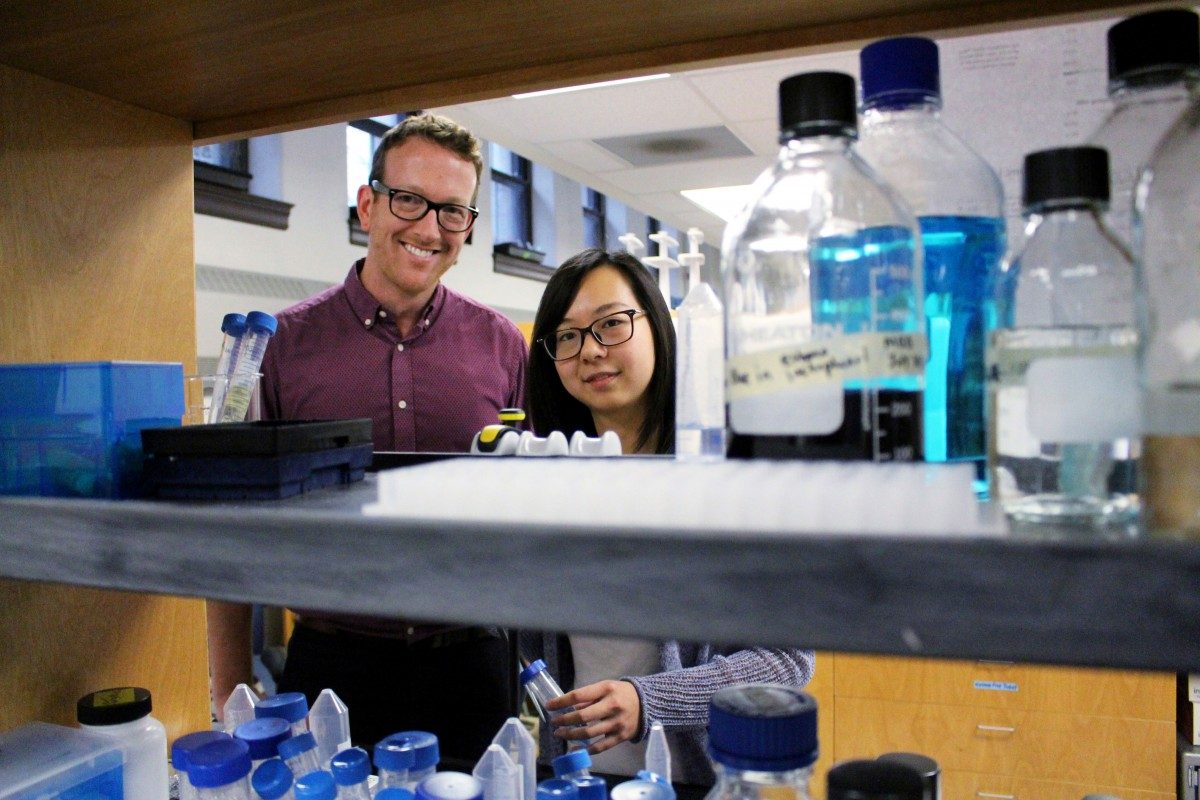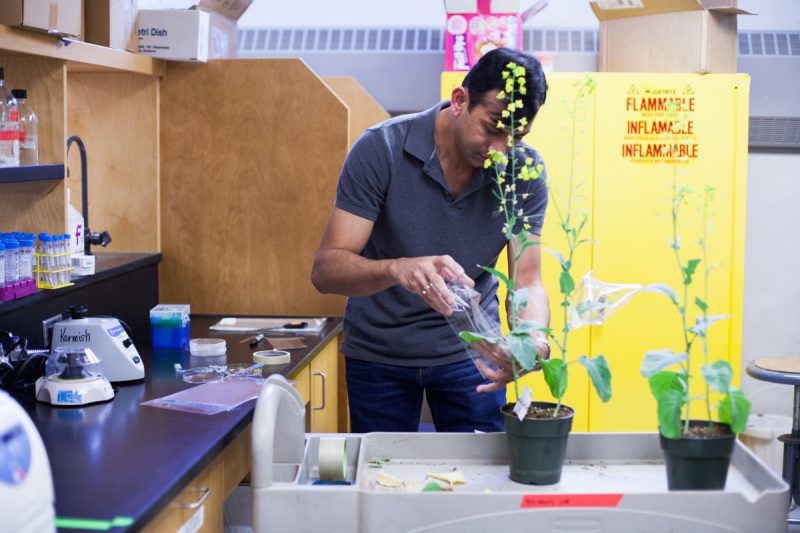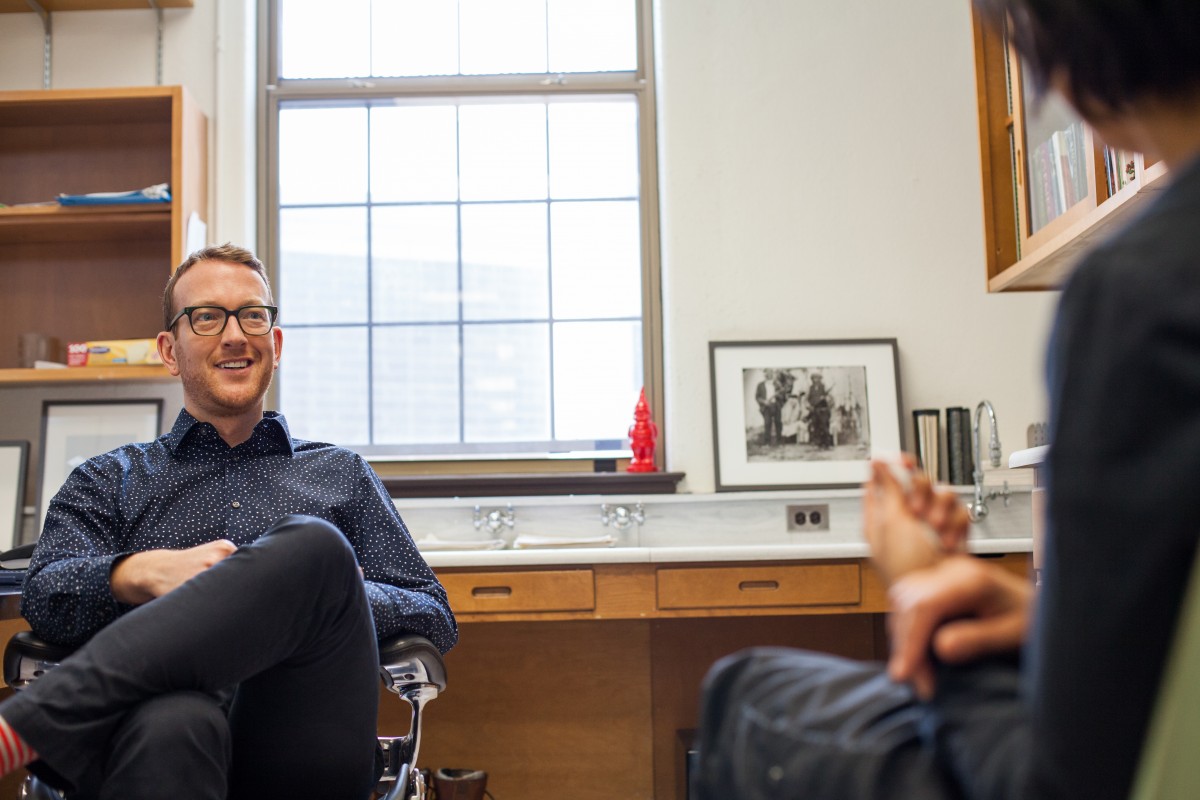
Mark Belmonte mentored Vanessa Hoi as part of Experience Research, the undergraduate research award offered by the office of the vice-president (research and international) // Photo: Kaitlin Vitt
Marching for Science to effect positive change
Dr. Mark Belmonte and the importance of science, now and in the future
Saturday, April 22nd is Earth Day, when a multitude of events are held world-wide to demonstrate support for environmental protection. One of these is “The March for Science”, and it will see scientists around the world unite to protest President Donald Trump’s stance on climate change and on science. To date, Trump has not only named a climate change doubter (Oklahoma Attorney General Scott Pruitt) to head the Environmental Protection Agency, he’s said he would like to eliminate that agency altogether, in addition to gutting current environmental policies.
One of the voices heard at Winnipeg’s “March for Science” will be that of Biologist, Dr. Mark Belmonte, department of biological sciences, who knows well the importance of continued support for scientific research. He has spent the past seven years with his students, studying the cellular and molecular functions of plant production and pathogenesis.
“Right now we’re trying to find new and innovative strategies to protect some of Canada’s and the globes’ most important crops. This all revolves around food security: how do we make bigger, better plants? How do we make plants that have more nutrition? How do we protect plants against disease? How do we grow plants in an ever-changing environment?

Photo: Kira Koop
“We use different tools, from classic anatomical studies all the way through to next generation sequencing ….We’re using laser microdissection to pull out individual cells from the plant, because each cell can respond differently to either disease or changes in the environment. We want to be able to understand how each cell is programmed and how they coordinate and communicate with each other in order to survive and to provide us with the food that we need.”
When asked about his participation in this week’s “March for Science”, Belmonte expresses his desire to shed light on the importance of science in our society. This willingness to ‘stand up and be counted’ prompts the question: Is he an optimist or a pessimist?
Belmonte confesses: “I’m an optimist when it comes to science, and where [it’s] moving, especially in Canada. … We’re in an age that is providing so much opportunity for young scientists to answer some of the most fundamental questions that we’re [faced with].
“Whether it’s in the natural sciences of trying to feed the 9.1 billion people that are going to be on this earth in the next 25 years, or … finding new and innovative solutions for curing diseases such as cancer or HIV. There are so many tools available to the scientific community – it’s really about how you access those tools, and how do you provide the necessary training environment for young scientists to be able to solve some of these problems.”
Rather than focusing on the ‘doom and gloom’ emerging from scientific communities in the United States who have been hit hard by recent funding cuts, Belmonte chooses to see the current situation as an opportunity:
“I think this is our time to shine and to … take a leadership role when it comes to … research in the environment or finding new and innovative ways in developing renewable energy strategies. I think it’s a matter of [needing] to be creative in terms of how we approach these questions. We also have to be at the cutting edge when it comes to providing young students with the funding and resources they need to reach their goals. There are already a lot of resources available. It’s a matter of how we tap into those resources by reaching out to the broader scientific community.”

Dr. Mark Belmonte // Photo: Kira Koop
Belmonte points to the need for better synchronization of financial support amongst Canada’s three major funding agencies (NSERC, SSHRC and CIHR): “… To answer really big [scientific research] questions that have significant value for Canadian society, we have to coordinate effort between [them]… Right now that doesn’t exist.”
While it’s readily apparent that Belmonte’s hope for the future rests with the young scientists of today, for right now, he is focused on using this Saturday’s march to bring attention to the importance of science, data and empirical evidence when it comes to policy making at all levels of government. “Hopefully we can use science, data, and evidence to make positive changes for society.”
The Faculty of Science supports the March for Science, organized by Science First, event details are as follows:
What: March For Science (Rally & guest speakers)
When: April 22, 2017:
Location: Manitoba Legislature
Time: 1pm – 2pm
Cost: Free
Guest speakers include:
Michael Paterson – Senior Research Scientist, IISD-ELA
Andrew Park – Associate Professor of Biology, University of Winnipeg
Mark Belmonte – Associate Professor – Department of Biological Sciences, Faculty of Science, University of Manitoba
Deirdre Khan – Master of Science, Department of Biological Sciences, Faculty of Science, University of Manitoba
Details are online at: www.sciencefirst.ca
Research at the University of Manitoba is partially supported by funding from the Government of Canada Research Support Fund.






